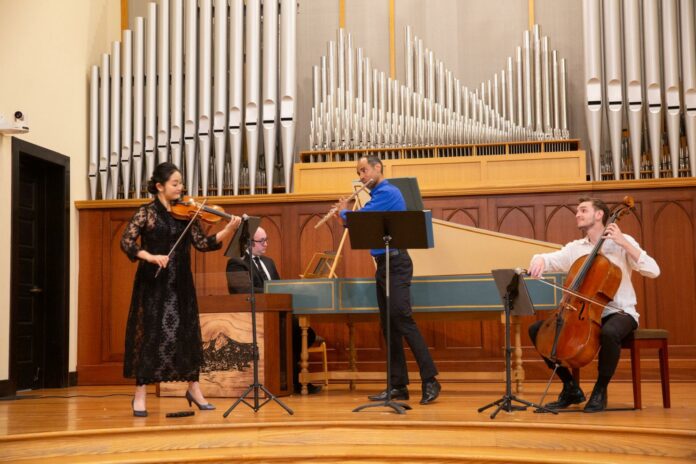By Angelica Olstad
When one thinks of Boulder, Colorado, world-class music festival is probably not the first thing that comes to mind. However, on May 12th – May 15th in 2022, the Boulder Bach Festival presented its annual festival week and it did not disappoint.
As a Boulder High School alumnus, my formative musical years were shaped by the Boulder public school music programs. I even competed in the Boulder Bach Festival (BBF) when I was a kid myself. I was a rare breed of a Colorado local who didn’t participate much in outdoor activities mostly because I was focused on honing my craft in the performing arts and music. Naturally, a move to New York made a lot of sense for me and it was only after living in the city did I finally develop a love for the outdoors which I did through OutdoorFest and Mappy Hour.
Serendipity tied me back to Boulder in a unique way. Mina Gajic, an old music colleague from my grad school years, now lives in Boulder, Colorado. There, she is the Artistic Director of BBF where she works alongside her husband, co-director and conductor, Zachary Carretin. Together, they have been running the organization for nine years.
When Mina asked me to cover the festival I couldn’t resist the full-circle opportunity to attend the festival that played a role in my own musical upbringing.
Boulder Bach Festival has been around for a while, 41 years to be exact. Throughout the years, the organization has gone through various iterations as a music organization. Under Gajic and Carretin’s guidance, the organization now attracts world-class talent and hosts a robust offering of programming all year round. Festival week is the organization’s tentpole event.

BBF also has something that many other early music organizations do not have, access to rare period instruments for their musicians to perform on.
Classical music instruments have evolved over time. The modern instruments we know now looked and sounded different hundreds of years ago and many are surprised to learn that the modern concert piano is relatively new. The concert grand piano was created to meet the pyrotechnics of the romantic turn of the century composers such as Liszt, Brahms, Schumann, and Rachmaninoff.
The music of Bach, Mozart, Haydn, Schubert, Beethoven and even as late as Chopin were written for different instruments (eg harpsichord and pianoforte) They were the predecessors to the modern piano as we know it. In today’s world of music, these instruments are referred to as “period instruments”.
The resurgence of playing music on period instruments is founded on the premise that by playing music on the instrument that it was written for, the listener experiences a more accurate version of how the composer would have either played it or envisioned the music to sound. Essentially, it brings us one step closer to experiencing a Mozart sonata as Mozart himself would have played it.
Enter BBF’s uniquely rare collection of period instruments. The festival featured BBF’s double flemish harpsichord. This year also featured a crowd favorite from Gajic’s personal collection, a showstopping blue and gold painted 19th-century Erard concert grand piano in pristine condition. The Erard piano is most famously known as the piano that Chopin played but in reality, the instrument attracted many turn-of-the-century composers and musicians for its colorful and light sound quality.
The festival was ambitious, consisting of four days of full full-length programs featuring some of the world’s finest early music interpreters hailing from London, Los Angeles, New York, Amsterdam, Chicago, and of course, Colorado.
As part of the BBF’s four-day festival, there were also master classes, daily lectures that accompanied the day’s program, discounts to local restaurants, and even a forest bathing session led by one of BBF’s musicians who played a period lute instrument as part of Mappy Hour.
Day 1
I arrived to the Boulderado, a historical Boulder institution. After checking in, I grabbed a bite at the Corner Cafe. Then I went to Chautauqua for a quick hike and enjoyed the sites before attending the night’s performances.
Upon arrival, I checked out the day’s program. My first observation was that many of the pieces were not actually written by Bach but instead, featured composers who were in some way influenced or were contemporaries of Bach. It was a testament to how far-reaching Bach’s legacy really is in western classical music.
Mina Gajic’s flawless interpretation of the virtuosic Harpsichord Concerto in D minor for harpsichord and strings, BWV 1052, was a highlight of the night. Her bold, fearless, and perfect technique came through on the flemish harpsichord she played on.
Other highlights of the night were the emotive stylings of flutist, Ysmael Reyes who performed the recently re-discovered Teleman Concerto in G Major; the fun, lively, and spirited performance by violinists Yu-Eun Kim (2018 Art of Duo Competition winner) and co-director Zachary Carretin’s virtuosic playing of Concerto in D Minor for two violins, strings, and basso continuo. Improvised basso continuo, an all but forgotten art performed by Christopher Holman (one of the world’s few premiere organists), was a particular joy to experience in person.

Day 2
For my second day in Boulder, I decided to walk along the Boulder Creek. After a brief meditation session by the water, I felt a renewed sense of calm and excitement as I entered the venue for Day Two of the festival.
I particularly enjoyed the Trio Sonata in G Major, BWV 1039 by Bach which featured Ismael Reyes again on flute, Yu-Eun Kim on violin, New York-based cellist, Coleman Itzkoff, and Christopher Holman on both harpsichord and organ (yes, he played two different instruments at the same time). I hadn’t known of this trio before attending and really enjoyed the unconventional instrumentation of the ensemble.
The night was rounded out by a brilliant solo performance by BBF’s Co-Director Zachary Carretin’s playing Teleman’s Fantasie No. 1 for violin solo that truly showcased him as one of the country’s top early music performers.
Day 3
The next day I headed to the NCAR – Table Mesa trailhead. This was one of my go-to’s as a kid growing up. Happy and energized, I got ready for Day Three. This ended up being my favorite program of the whole festival.
The program featured two female composers (a rarity in classical music): Clara Schumann (wife of Robert Schumann, mother of concert pianists) and Lili Boulanger, sister to the famous Nadia Boulanger who was a teacher to many important and influential performers and composers such as Phillip Glass, Aaron Copland, and Quincy Jones to name a few.
Gajic gave a brilliant interpretation of the famous solo Mozart Fantasia in D Minor, K. 397 followed by a moving rendition of Clara Schumann’s art pieces with Chicago-based soprano, Josefien Stopplenberg. Gajic also played alongside Yu-Eun Kim for a violin / piano for a delightful and lesser-known duet titled, D’un matin de printemps by Lili Boulanger.
The highlight of the night (and of the entire festival in my opinion) was the Piano Quartet in G Minor, K. 478 by Mozart which featured Mina Gajic on keyboard, Paul Miller on viola, Coleman Itzkoff on cello, and Yu-Eun Kin on violin.
Chamber music is hard to do well. I like to compare classical music performances to watching professional sports. It takes years of study, discipline, and guidance to be able to not just execute but to also collectively and unilaterally work together to create a strong point of view that is both accurate to performance practices but innovative and original in its interpretation. If the musicians work together well, rehearse well, and communicate well, they can make magic happen.
The ensemble performing the quartet gave an outstanding performance that created a magical experience. The quintet exemplified world-class music at its finest.
Day 4
Still buzzing from Day Three, I decided to do a walking meditation in the fields of Boulder High School. I did some grounding exercises, enjoyed the greenery, and reminisced on my own experiences growing up as a musician in Colorado.
The fourth and final day was titled, The Intimacy of J.S. Bach. In honor of its namesake, the program featured all Bach programming and featured a range of solo work, chamber music and choral work to close out.
One notable moment was when New York-based cellist Coleman Iztkoff gave a heartwarming speech before playing the all-famous solo cello suite, Suite No. 5 in C Minor for Cello Solo BWV 1011. Before playing, he expressed a great appreciation to the organizers of BBF for providing the opportunity to create high-level music making and said, “As a New York artist, I can tell you, opportunities like this don’t exist even in New York. This is truly unique to be here doing this in Boulder, Colorado”.
As a twelve year resident of New York, I couldn’t have agreed more.
My own experience with Boulder has sometimes been a difficult one. As a kid who grew up focused on the performing arts, the limitations of Boulder’s cultural and arts scene often felt frustrating. Yes, the mountains and the nature opportunities are in a class of their own, but I felt like in order for me to pursue a career in the arts, I had to leave Colorado to find my own path in music.
Listening to the festival’s performances gave me pause to think about how lucky the residents of Boulder are to have such visionary directors like Zachary Carretin and Mina Gajic at the helm of BBF.
Both Gajic and Carretin are impressive musicians whose respective international careers have made them exceptional advocates for the organization. Under their leadership, BBF has been transformed into a world-class music organization. By leveraging a hefty and impressive network of top-tier talent, they bring an unprecedented level of musicianship to the organization and to Colorado’s classical music scene as a whole.
BBF, in its most current iteration, is now a performing arts organization bringing in a star-powered international roster of early music musicians to perform innovative programming that reaches beyond the traditional canon. In the current state of affairs in today’s classical music scene, this is rare. What’s even more surprising is that an organization of this calibur has found its footing in an unassuming place like Boulder, Colorado where the success of the organization’s transformation was made possible by the arts-loving community of BBF. As someone who left home in search of a life in music, coming back to watch this year’s festival was refreshing, uplifting, and inspiring.
The saying is that you can never go home again but for the first time in a long while, I felt like Boulder was a place I could come back to again and again.
Make sure to check out Boulder Bach Festival and their upcoming programming opportunities HERE!

